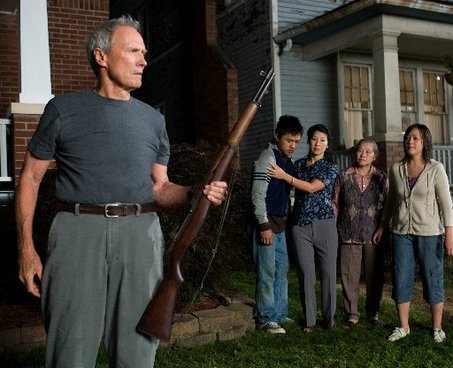I’m still doping out what I think of The Curious Case of Benjamin Button and Gran Torino, although I did see the latter in time and liked it enough to slip into some of my end-of-the-year ten-best lists. (Since my thoughts and inclinations tend to change over time, I’m reluctant to keep recycling the same list every time I’m asked for one.)
Having just seen Benjamin Button, I still don’t know whether I might have included it in any of my lists, but I have to admit that I suspect I already prefer it to all of Fincher’s other films, with the possible exception of Se7en. It took me a while to warm to the weird premise and some of the grotesqueries it involves, but I think part of what impresses me is how nervy it is in playing out the poetry of the conceit for all that it’s worth and letting all the social-historical elements—from two world wars to Hurricane Katrina (and not overlooking the degree to which it sidesteps all the racial issues)–take a back seat to the love story. It’s also more impressive to me visually than Fincher’s other works. Whatever one concludes about the story and all its ramifications, he certainly knows how to fill a frame.
Gran Torino‘s own narrative premises are in some ways almost as unbelievable as Benjamin Button‘s, even if we can more readily succumb to them for generic reasons. There are plenty of narrative and psychological gaps (or perhaps i should say holes); simply trying to get some rudimentary notion of what the racist hero’s just-deceased wife was like or how he related to her when she was alive gets one nowhere. What’s so nervy in this case—making it for me far more interesting than Eastwood’s overstuffed Changeling—is not just the upfront way it deals with American xenophobia and hatred, which are given Fulleresque dimensions, but the way the movie allows Eastwood to rethink his macho persona yet again, making it for me his most interesting performance since he deconstructed John Huston in White Hunter, Black Heart.
It’s intriguing to consider the radical split in the reviews of the Fincher movie between the indignant responses of Roger Ebert and Scott Fondas to the enthusiasm of A.O. Scott (even though the latter does own up to some of the ideological issues at stake). There’s also some apparent discomfort in many of the reviews of the Eastwood film—including even some of the favorable ones, which insist on calling it a “minor” work in the Eastwood oeuvre. (Does Changeling‘s Snake Pit melodrama and White-Elephant-Art grandstanding qualify as “major” by comparison?) The ambivalent way Eastwood views his own character hardly makes this film a lefthanded gesture, any more than the comparable ambivalence in his view of the macho director in White Hunter had anything minor about it. The underplayed final scene of White Hunter may even be for me the most perfectly realized moment in Eastwood’s work to date. And despite the fact that Gran Torino is relatively bombastic, Eastwood’s performance in it seems no less measured and considered. [12/26/08]


